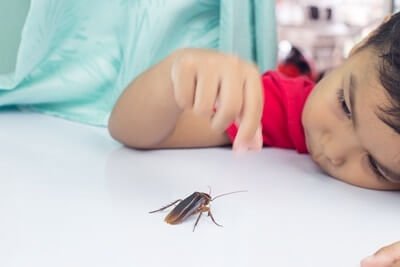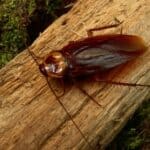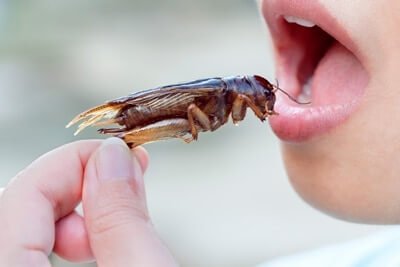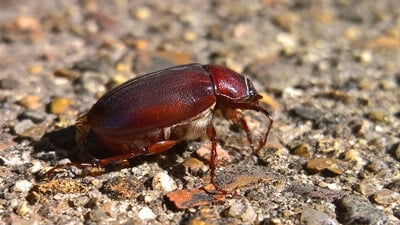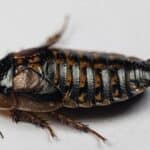A nightmare for many people is a cockroach crawling into your ear and getting stuck in there. Unfortunately, there’s more truth to this fear than most of us realize. Gross as it may seem, earwax is a substance that cockroaches will eat. A roach may be able to slip into your ear and out again without fuss. However, larger cockroaches can get stuck.
Cockroaches can crawl into human ears in their quest for food. This is most likely to happen at night while you’re sleeping when these nocturnal insects are most active. A cockroach will crawl into your ear to consume earwax and could become stuck. The roach may then die due to dehydration or by being crushed by you.
Don’t use tweezers or Q-tips to remove a cockroach from your ear. Either shake the cockroach free by tipping your head to the side or flush it out with warm water. It’s recommended that you ask a doctor to remove the roach. If the roach dies, a decaying body will result in harmful bacteria, yeast, and fungi. This can lead to painful ear infections.
Can Cockroaches Enter Your Ear?
Cockroaches, and other insects, can enter your ear. According to the South African Medical Journal, roaches are among the most common offenders, accounting for 42% of insect-related ear invasions. Our ears are attractive to roaches.
Our ears are small, warm, damp, and full of earwax, which cockroaches will eat. Cockroaches are well-known for eating anything they can find. This includes:
- Food scraps
- Dead animals
- Fecal matter
- Leaf litter
- Cardboard
- Human hair
Why Do Cockroaches Like Earwax?
Humans produce two types of ear wax. As noted in Nature Genetics, these types are broken into two classifications:
- Wet earwax
- Dry earwax
Cockroaches eat both types. They emit a smell, which entices cockroaches to crawl into human ears.
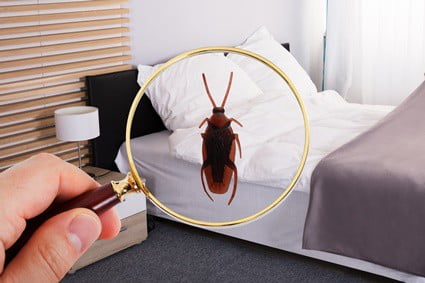
Do Cockroaches Live In Human Ears?
Cockroaches can squeeze themselves into small spaces, including the narrow ear canal. Small cockroaches can move freely in and out of the ears.
However, the inner ear is a temporary home for small cockroaches. It’s warm and damp and produces food. A cockroach may live there for a while and move on. Alternatively, it may grow to the point where it can’t leave.
Larger cockroach specimens can get stuck in your ear. This is where complications can arise.
How Long Can A Bug Live In Your Ear?
Cockroaches can live for up to a week without water and slightly longer without food. A roach stuck in your ear may die within a week of being trapped. However, water from the shower can sustain the cockroach for a time. Depending on the moisture content of your earwax, it may also be able to live off of this liquid as well.
What Kills Roaches In Your Ear?
A cockroach that gets stuck in your ear will likely die from being crushed. Before starvation or dehydration can occur, the normal movement and activity of a human will endanger it. This may involve:
- Rolling onto your side in the night, pressing your ear to the pillow
- Scratching your ear forcefully
- Using Q-tips or other cotton swabs in your ear to remove wax
Each of these might only disturb the cockroach, causing it to shuffle around. That’s usually what tips people off to the presence of an insect in the ear.
However, if the roach is small or patient, it may not move. Instead, with the right placement and the correct amount of pressure, these actions may crush a small roach. That could leave the insect dead in your ear without you noticing.
If you swim, you may also drown the cockroach. The water may even flush the roach out without you even realizing it. Just keep in mind that cockroaches can survive numerous minutes without oxygen, making it difficult to drown one. You would notice water refusing to drain from your ear first.
Do Cockroaches Crawl On You At Night?
The endless quest for food draws cockroaches everywhere. At night, they will roam to locations that they know hold food. Armed with a refined sense of smell, cockroaches will wander through your home until they find a scent trail. So, a cockroach may crawl on you at night if it can smell food. It could be attracted by:
- Earwax
- Food crumbs
- Toothpaste
Once roaches learn that they can find food in this area, they will return from then on. Their lightweight build means you may be unaware of their presence. Likewise, most cockroaches make no sound so that they can feed unchecked.
What Do Roaches Eat On Humans?
A starving cockroach will eat your skin. It may nibble at dead skin flakes or try to bite you. If you allow pets to sleep in your bedroom or on the bed, a cockroach may do the same to them.
However, roaches prefer readily available food. Skin cells it needs to peel or bite off are less appealing (but still acceptable). That’s why you’ll find roaches in your kitchen, near open food or garbage. They won’t attack people in the night unless there are few (or no) other options.
Do Roaches Crawl In Ears At Night?
The night is when cockroaches are most likely to crawl into your ear. Since roaches are nocturnal, this is when they’ll be most active. If they are accustomed to living alongside humans, they will also register nighttime as the safest time to forage for food.
How To Keep Cockroaches Off You
Keeping cockroaches away from you at night requires regular cleaning and hygiene. Depriving the cockroaches of food will prevent travelers from sticking around. For example:
- Frequently flush earwax free with warm water.
- Shower before bed, using citrus-based shampoos or soaps (as roaches hate this smell).
- Wash off toothpaste before going to bed, as small traces attract roaches.
- Clean your sheets and never eat in bed. Crumbs may attract cockroaches.
Barriers
If you’re concerned, you can take a more direct approach:
- Wear earplugs. This prevents the roach from gaining access at all.
- Braid your hair to cover the ears. This allows you to hear but creates a barrier against roaches.
- Place roach traps around your bed. Roach traps often have tempting bait within, which is more appealing than earwax. It’s also more readily available, luring roaches away from you.
Deterrents
You can also use scent deterrents to ward them off as well. Essential oils for repelling cockroaches include:
- Peppermint
- Cypress
Spritz these under your bed and anywhere you’ve seen cockroaches. That should encourage roaches to seek out other options before muscling through the bad scent. Be careful of essential oils because some of them can be toxic to pets.
Bar Access To Your Bed
You can also make it difficult for cockroaches to get onto your bed:
- Remove any bed skirts, sheets, or blankets that hang over the edge of the bed to prevent them from climbing up.
- Spritz a deterrent spray on and around the base of the bed frame’s legs.
- Surround the bed frame legs in a surface that roaches cannot climb, like glass.
Can Cockroaches Lay Eggs In Your Ear?
Cockroaches do not commonly lay eggs in human ears. That’s because they need a safe environment for their offspring. While the human ear is an appealing home, it’s also dangerous. It moves, flexes, and is exposed to all kinds of changing sounds. Roaches prefer quiet, secluded places with no activity for their eggs. There’s also the matter of size. Laying eggs is a very physical process, unlike eating and dashing away.
Of all the cockroach species found in the U.S., the brown-banded cockroach is the smallest. Reaching ½ inch in size as an adult, this cockroach would struggle to fit in your ear to lay eggs. As a cockroach species that can tolerate a drier environment than others, it is one you may find more commonly in bedrooms and living rooms.
German cockroaches are also a common intruder of people’s ears. Full adults would find it difficult to lay a full clutch in the small space of an ear. Nonetheless, it does happen. Cockroaches that are small enough at breeding age may lay their eggs in a person’s ear. This is rare, though.

Cockroach In Ear Symptoms
There are signs that a cockroach is in your ear. The inner ear is sensitive, and in most cases, you will be able to tell when a foreign body has crawled inside. However, some people may ignore or misinterpret these symptoms. Always pay attention if you:
- Feel and hear something crawling around
- Hear an intermittent buzzing
- Feel discomfort and pain
- Experience a full or fullness sensation in the ear
- Suffer from swelling of the inner or outer ear
- Notice bleeding or pus from the ear
- Experience hearing loss
You may, with the help of a few mirrors or a second person, be able to see the cockroach itself.
A distressed or starving cockroach may also bite at your flesh. In this case, it’s difficult for people to resist digging at their ears. However, you should keep calm and avoid doing so. You may crush the cockroach and push it deeper into your ear, near the eardrum. The barbed legs of a cockroach can easily perforate the delicate eardrum.
Can You Leave A Dead Bug In Your Ear?
Dead cockroaches must be removed from your ear. The decaying body will produce damaging:
- Bacteria
- Fungus
- Yeast
The cockroach itself carries harmful bacteria. If you thought your trouble was over, remember that scent trails exist. Other roaches may smell the decaying body, drawing even more roaches to your ear.
As stated in Ear Hear, inner ear infections commonly result in hearing loss and balance issues. It is critical to see a doctor if you suspect an ear infection, regardless of a bug being the catalyst.
A doctor will be able to remove the bug from your ear safely. Depending on what the doctor sees, they may prescribe a treatment course. They will also be able to:
- Inspect the ear for signs of infection
- Flush out any dislodged body parts or fecal matter
Can A Bug Crawl In Your Ear To Your Brain?
No bug can crawl into your ear and get to your brain. That’s because your brain is encased in your skull. There is no tunnel or passageway between your ear and the brain. Insects would need to chew through solid bone.
Even if one could, the pain would alert you well before the roach breached your skull. With that said, an inner ear infection caused by a cockroach may spread to the sinuses and nose. From here, it can spread to the brain. However, this is a rare outcome of an ear infection.
As worrying as it is to have a cockroach wriggling in your ear, you should go to a doctor to have it removed. Tempting as it may be to remove it yourself with tweezers, you risk pushing it deeper and rupturing your eardrum.
